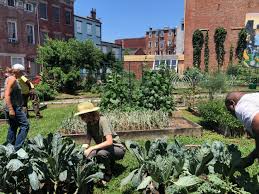
The Benefits of Community Gardening
Community gardening is a wonderful way to bring people together and cultivate a sense of belonging and connection within neighborhoods. These shared green spaces offer numerous benefits to individuals and communities alike.
Promotes Healthy Eating
Community gardens provide access to fresh, locally grown produce, making it easier for residents to incorporate healthy fruits and vegetables into their diets. This can lead to improved nutrition and overall health in the community.
Fosters Social Connections
Gardening in a communal setting encourages social interactions and fosters relationships among neighbors. It provides opportunities for people of all ages and backgrounds to come together, share knowledge, and work towards a common goal.
Enhances Environmental Sustainability
Community gardens promote sustainable practices such as composting, water conservation, and organic gardening techniques. By growing food locally, communities reduce their carbon footprint associated with transportation and support biodiversity in urban areas.
Improves Mental Wellbeing
Gardening has been shown to have therapeutic benefits for mental health. Engaging in gardening activities can reduce stress, anxiety, and depression while promoting mindfulness and a sense of accomplishment.
Strengthens Neighborhood Resilience
Community gardens create resilient neighborhoods by providing food security during times of crisis or uncertainty. They empower residents to take control of their food sources and build self-sufficiency within the community.
In conclusion, community gardening is more than just growing plants – it is about nurturing relationships, fostering sustainability, promoting health, and building stronger communities. By participating in or supporting community garden initiatives, individuals can make a positive impact on both their local environment and the well-being of those around them.
6 Essential Tips for Building a Thriving Community Garden
- Select a suitable location with access to sunlight and water for your community garden.
- Organize regular meetings with fellow gardeners to plan and coordinate tasks.
- Encourage diversity in plant selection to promote ecosystem health and resilience.
- Implement sustainable gardening practices such as composting and rainwater harvesting.
- Establish clear guidelines for sharing responsibilities, produce, and resources among participants.
- Engage with the local community through events, workshops, or educational programs to foster interest in gardening.
Select a suitable location with access to sunlight and water for your community garden.
When establishing a community garden, it is crucial to select a suitable location that receives ample sunlight and has easy access to water sources. Sunlight is essential for the growth of plants, as it provides energy for photosynthesis and helps ensure healthy development. Additionally, proximity to water sources simplifies the watering process, ensuring that plants receive adequate hydration for optimal growth. By choosing a location with these key features, community gardeners can create an environment that fosters thriving plant life and successful gardening endeavors for the entire community to enjoy.
Organize regular meetings with fellow gardeners to plan and coordinate tasks.
Organizing regular meetings with fellow gardeners is a crucial tip for successful community gardening. These meetings provide a platform for gardeners to come together, share ideas, plan tasks, and coordinate efforts effectively. By discussing schedules, assigning responsibilities, and setting goals collaboratively, gardeners can ensure that the community garden thrives and remains well-maintained. Regular communication and coordination help build a sense of teamwork and camaraderie among participants, leading to a more productive and enjoyable gardening experience for all involved.
Encourage diversity in plant selection to promote ecosystem health and resilience.
Encouraging diversity in plant selection is a crucial tip in community gardening to promote ecosystem health and resilience. By cultivating a variety of plant species, community gardens can support a robust ecosystem that attracts beneficial insects, pollinators, and wildlife. Diverse plantings help prevent the spread of pests and diseases, improve soil health, and create a more balanced and resilient environment. Embracing plant diversity not only enhances the beauty of the garden but also contributes to its long-term sustainability and overall well-being.
Implement sustainable gardening practices such as composting and rainwater harvesting.
To enhance the sustainability of community gardening initiatives, it is essential to implement eco-friendly practices like composting and rainwater harvesting. Composting organic waste not only reduces landfill waste but also enriches the soil with valuable nutrients, promoting healthy plant growth. Similarly, collecting rainwater for irrigation minimizes water waste and reduces reliance on municipal water sources, contributing to water conservation efforts. By incorporating these sustainable gardening practices into community gardens, participants can cultivate a more environmentally friendly and self-sufficient gardening ecosystem that benefits both the plants and the surrounding environment.
Establish clear guidelines for sharing responsibilities, produce, and resources among participants.
Establishing clear guidelines for sharing responsibilities, produce, and resources among participants is essential for the success of a community gardening project. By clearly outlining expectations and agreements upfront, all members can understand their roles and contributions, fostering a sense of accountability and teamwork. This practice helps prevent misunderstandings, promotes fairness in resource allocation, and ensures that everyone benefits equitably from the collective efforts put into the garden. Clear guidelines also encourage open communication and collaboration among participants, leading to a harmonious and productive community gardening experience for all involved.
Engage with the local community through events, workshops, or educational programs to foster interest in gardening.
To foster interest in gardening within the local community, it is essential to engage with residents through events, workshops, and educational programs. By organizing interactive gardening workshops, hosting community events centered around sustainable gardening practices, and offering educational programs on horticulture and environmental stewardship, we can inspire and empower individuals to cultivate their own green spaces. These initiatives not only educate participants but also create a sense of camaraderie and shared purpose among community members, strengthening the bond between people and nature while promoting a culture of environmental awareness and sustainability.
